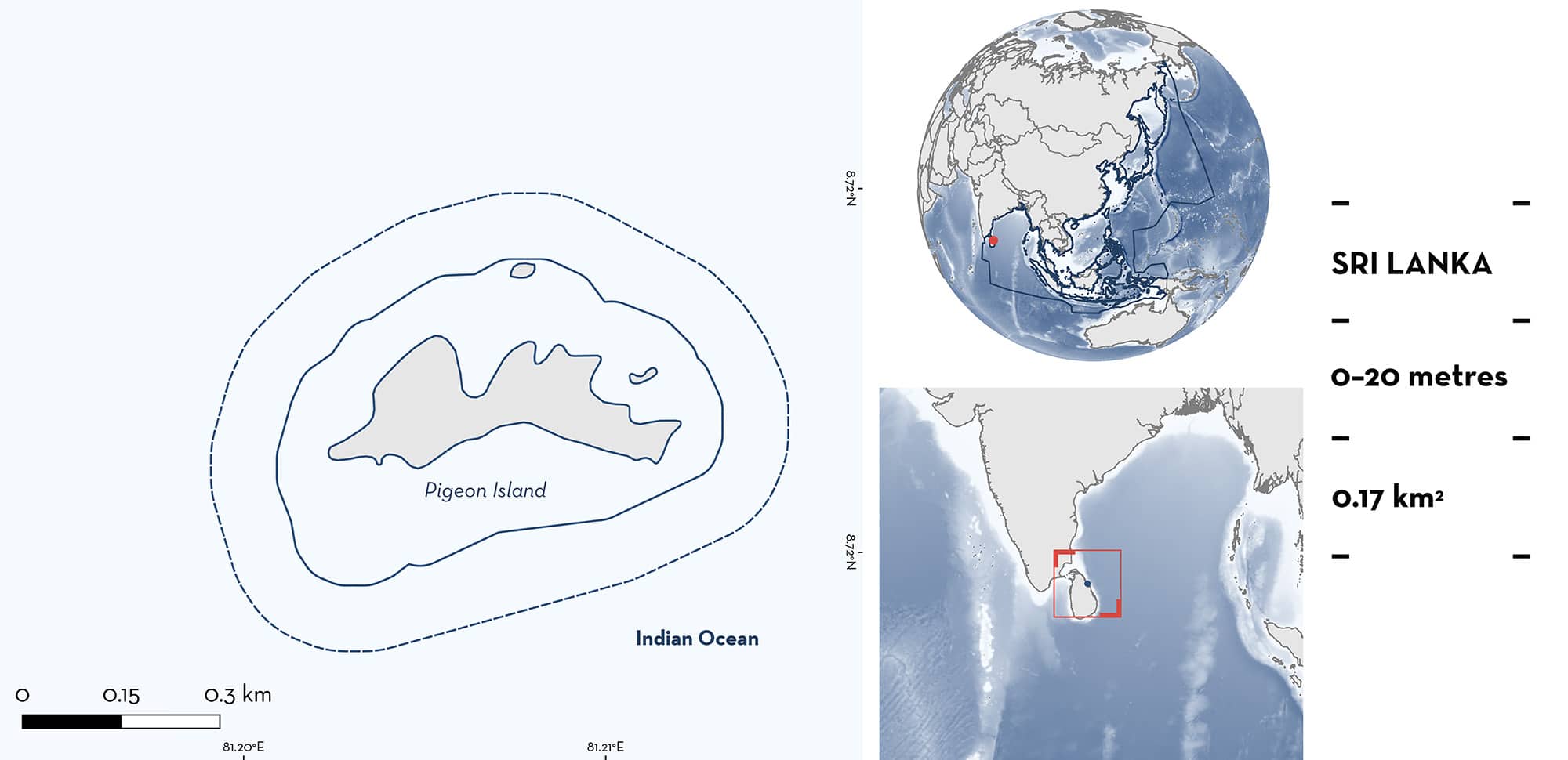ISRA FACTSHEETS
ISRA FACTSHEETS
ASIA REGION
Pigeon Island
Summary
Pigeon Island is located on the eastern coast of Sri Lanka. The area surrounds an island with rocky cliffs adjoining a coral reef system. The area overlaps with Pigeon Island Marine National Park and the Trincomalee Canyon and Associated Ecosystems Ecologically or Biologically Significant Marine Area. Within the area there are: threatened species and undefined aggregations (Blacktip Reef Shark Carcharhinus melanopterus).
Download factsheet
Pigeon Island
DESCRIPTION OF HABITAT
Pigeon Island is located on the eastern coast of Sri Lanka in the Trincomalee district. It is situated 2.3 km from Nilaveli Beach. The area is limited to one of the two islands (Pigeon Island) that make up the Pigeon Island Marine National Park, with rocky cliffs and surrounding coral reef systems (Perera & Kotagama 2016). The area hosts a 200 m long and 100 m wide coral reef with a diversity of hard (including Acropora spp., Montipora spp., Millepora spp.) and soft (Sinularia spp., Lobophyton spp., Sarcophyton spp.) corals.
The area is characterised by an annual rainfall ranging from 1,000 to 1,700 mm, with most of the rainfall during the northeast monsoon, from October to March.
The area overlaps with Pigeon Island Marine National Park and the Trincomalee Canyon and Associated Ecosystems Ecologically or Biologically Significant Marine Area (EBSA; CBD 2024).
This Important Shark and Ray Area is benthopelagic and is delineated from inshore and surface waters (0 m) to 20 m based on the bathymetry of the area.
CRITERION A
VULNERABILITY
One Qualifying Species within the area is considered threatened with extinction according to the IUCN Red List of Threatened Species. The Blacktip Reef Shark is assessed as Vulnerable (Simpfendorfer et al. 2020).
CRITERION C
SUB-CRITERION C5 – UNDEFINED AGGREGATIONS
Pigeon Island is an important area for undefined aggregations of one shark species.
Blacktip Reef Sharks are regularly and predictably observed aggregating in the area year-round. These sharks are a known popular snorkelling attraction at Pigeon Island (Divinguru 2024; Pigeon Island Diving Centre 2024; Sri Lanka Diving Tours 2024) and are consistently observed by resident rangers, tourists, and researchers. For example, aggregations were observed on all of 10 research trips in the calm season (May–October) between 2017–2023 (Blue Resources Trust unpubl. data 2017–2023). Resident wildlife wardens on the island report the species year-round, with near daily observations during patrols in early 2024, highlighting the continuing and persistent nature of the aggregations (M Morathenna, Department of Wildlife Conservation pers. comm. 2024). Apart from observations of single individuals, observed groups typically comprise 2–10 individuals, although up to 30 have been observed on occasion. Behavioural observations indicate that the sharks appear to circumnavigate the island, remaining over the shallow coral reef habitat (Ilukdeniya & Thirumarpan 2019; Blue Resources Trust pers. obs. 2017–2023; M Morathenna pers. comm. 2024).
The Blacktip Reef Shark is a coral reef-associated species known to form aggregations in shallow inshore waters particularly around small islands, coral cays, and reef lagoons, with demonstrated strong site-fidelity (e.g., Papastamatiou et al. 2010). The coral reef habitat surrounding Pigeon Island offers suitable habitat with the protected status of the island (as a marine national park), along with popularity of the area as a dive and snorkel site, providing some refuge for Blacktip Reef Sharks. Indeed, this is the only known regular aggregation of this species along the eastern coast of Sri Lanka.
Download factsheet
SUBMIT A REQUEST
ISRA SPATIAL LAYER REQUEST
To make a request to download the ISRA Layer in either a GIS compatible Shapefile (.shp) or Google Earth compatible Keyhole Markup Language Zipped file (.kmz) please complete the following form. We will review your request and send the download details to you. We will endeavor to send you the requested files as soon as we can. However, please note that this is not an automated process, and before requests are responded to, they undergo internal review and authorization. As such, requests normally take 5–10 working days to process.
Should you have questions about the data or process, please do not hesitate to contact us.


